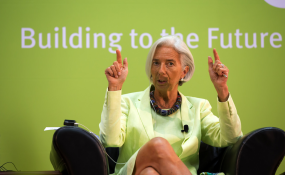Washington — The International Monetary Fund (IMF) announced on Thursday that the Mozambican government is willing to work with the IMF on the terms of reference for an international, independent audit of the companies funded by undisclosed government-guaranteed loans in 2013-14.
Mozambican President Filipe Nyusi met with IMF managing director Christine Lagarde on Thursday in Washington, as part of his four day working visit to the United States. During the meeting, Lagarde once again called for an independent audit of the hidden loans – and Nyusi appeared to agree with her.
According to a statement issued by Gerry Rice, the IMF's Director of Communications, Lagarde “welcomed the initial steps being taken on the agreed reforms and policies”, but also “stressed the need for further policy action aimed at stabilizing the economy and for more decisive efforts to improve transparency, in particular an international and independent audit of the companies that were funded under the loans disclosed in April 2016”.
Rice added that Lagarde “welcomed that the President indicated the Government of Mozambique's willingness to work with the IMF on the terms-of-reference for this process – to be initiated by the office of the Attorney General – and to implement it”.
To work on those terms of reference, an IMF staff team will visit Maputo next week, Rice announced.
This is in line with remarks made by Nyusi last Saturday at a press conference that concluded his visit to the southern province of Gaza, where he declared that the government is not opposed to an independent, international forensic audit of the loans.
Nyusi told the reporters “at no time has any member of the government said that a forensic audit was not going to be undertaken”.
“What we have been saying is that the cases are already under way at the level of the Attorney-General's Office and of the Assembly of the Republic (the Mozambican parliament)”, he added. “So the authorities are working”.
Prosecutors have already announced that there were illegalities involved in the loans. Although they were not specific, they presumably referred to the obvious violations of the limits on government guarantees for loans set in the 2013 and 2014 budget laws.
The controversy arises over three government guaranteed loans to quasi-public companies in 2013 and 2014, the closing years of the government of Nyusi's predecessor, Armando Guebuza. Between them these loans amounted to over two billion US dollars, and added 20 per cent to the Mozambican foreign debt.
One of the loans was public – this was the 850 million dollars of bonds launched on the European bond market by the Mozambique Tuna Company (EMATUM). The main banks handling the bond issue were Credit Suisse and VTB of Russia.
But the same two banks lent large, but undisclosed sums to the companies Proindicus (622 million dollars) and Mozambique Assets Management (MAM – 535 million dollars). Proindicus was set up to provide security to offshore oil and gas operations and to other shipping in the Mozambique Channel, while MAM is to sell naval maintenance and repair services.
It is these latter two loans and their government guarantees that angered the IMF. For the loans were not disclosed, either to the Mozambican public, or to Mozambique's foreign partners. When the loans became public knowledge in April, the IMF suspended its programme with Mozambique, including the second instalment of a 283 million dollar loan from the Standby Credit Facility (SCF). Other partners followed the IMF's lead – notably all 14 donors and funding agencies that provided direct support for the Mozambican state budget suspended all further disbursements.
The IMF suspected corruption was involved in the loans. In an interview with the BBC in May Lagarde said “When we see a country and a programme with the IMF where international community money is committed, that is not respecting its financial disclosure engagement, which is clearly concealing corruption, we suspend the programme. We did that just recently with Mozambique.'
The main demand raised by the IMF, and echoed by Mozambique's other western partners, such as the United States and Britain, has been for an international, independent, forensic audit which would track down exactly what happened with all the money involved.
The IMF statement on the Nyusi-Lagarde meeting indicates that such an audit will indeed happen, at least of the Proindicus and MAM loans.

